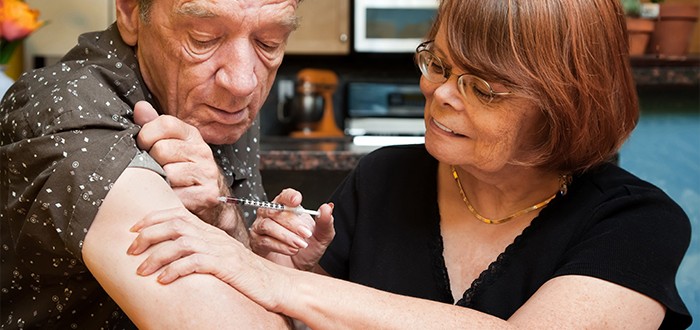Cancer clinicians attending the recent International Mesothelioma Interest Group (iMig) conference in the United Kingdom learned that Phase 2 testing of the WT1 mesothelioma vaccine galinpepimut-S ended satisfactorily.
Galinpepimut-S is a late clinical-stage cancer immunotherapy that targets malignant pleural mesothelioma and other solid tumors as well as certain hematologic cancers.
The Phase 2 clinical trial was conducted at two sites in the U.S. The first was Memorial Sloan Kettering Cancer Center in New York City. The second was the M.D. Anderson Cancer Center in Texas.
Mesothelioma Overall Survival Rates Up
Treatment with galinpepimut-S improved overall survival among mesothelioma patients in the clinical trial study cohort. Improvements were also seen in the patients’ progression-free survival rates.
Specifically, median overall survival in mesothelioma patients treated with galinpepimut-S was 21.4 months. This compared to a median of 16.6 months overall among mesothelioma patients given only a placebo.
Galinpepimut-S also resulted in a median progression-free survival of 11.4 months. The patients who were given only a placebo experienced progression-free survival of 5.7 months.
The researchers who conducted the Phase 2 trial reported that galinpepimut-S appears to have a “favorable safety and tolerability profile” with regard to malignant pleural mesothelioma.
The investigators concluded that galinpepimut-S may offer a significant survival benefit to mesothelioma patients who receive this WT1 immunotherapy in conjunction with complete tumor resection.
The researchers added that the findings were encouraging enough to that they will be conducting further testing later this year. A combined Phase 2b and Phase 3 trial is now set to get underway in late June.
Mesothelioma Patients Received Vaccine Treatment
The title of the presentation was “Randomized Phase II Study of Adjuvant WT1 Vaccine for Malignant Pleural Mesothelioma After Multimodality Therapy.”
The presentation was delivered to the iMig attendees by Marjorie G. Zauderer, M.D. She is a medical oncologist at Memorial Sloan Kettering Cancer Center and the principal investigator for the galinpepimut-S trial.
That trial was conducted in double-blind, randomized fashion. It evaluated galinpepimut-S in combination with Montanide-adjuvant + Granulocyte-macrophage colony-stimulating factor (GM-CSF) in mesothelioma patients who earlier received a combined modality therapy.
The trial then compared those results to an evaluation of Montanide-adjuvant + GM-CSF given to mesothelioma patients who also had earlier received combined modality therapy.
The researchers wanted originally to enroll 39 patients in each of those comparison arms. However, as the study progressed, the researchers realized they could un-blind the study earlier than anticipated.
The un-blinding left the researchers with 19 patients in the galinpepimut-S arm and 21 in the control arm – a total of 40 patients, rather than the planned 78.
Affinity for Mesothelioma WT1 Antigen
The WT1 antigen targeted by galinpepimut-S is a transcription factor seldom seen in healthy cells. It is, however, seen abundantly in cancer cells like mesothelioma.
The National Cancer Institute believes this makes WT1 a rich target for cancer immunotherapy. In fact, the Institute lists WT1 as the most important immunotherapy target of them all.
One reason for this top ranking is that a variety of peptide sequences from the WT1 antigen stimulate cytotoxic T-cells. These cytotoxic T-cells can find and destroy cells that plentifully express WT1.
In other words, cytotoxic T-cells can hunt and kill mesothelioma cells. Four modified peptide chains go into Galinpepimut-S. These chains cause CD4+/CD8+ T-cells to marshal against the WT1 antigen.
Galinpepimut-S is given to mesothelioma patients together with an adjuvant and an immune modulator. This combination boosts the innate immune system response by those CD4+/CD8+ T-cells.
Galinpepimut-S originated in the labs of Memorial Sloan Kettering Cancer Center and now is licensed to SELLAS Life Sciences Group of Zug, Switzerland. In the U.S., SELLAS is headquartered in New York City.

